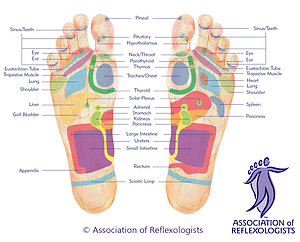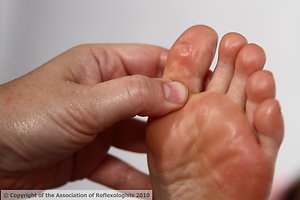6. CAN REFLEXOLOGY HELP ME?
People who contact me to enquire about reflexology usually have something going on that is causing a problem – sometimes a physical problem such as hormonal imbalance or various aches & pains. Very often they are experiencing a mental health issue such as anxiety, stress, insomnia or grief. People want to know if reflexology can help them.
What I believe is that a reflexology treatment enables your body to access its own healing power. During the reflexology session your central nervous system calms down allowing your hormone (endocrine) system to stop over producing stress hormones.
While you are relaxed, and I am working on the reflex points on your feet and ankles, your brain can make a connection with the areas of the body that are out of balance to direct healing resources efficiently.
I have seen new clients who have told me they cannot relax at all, cannot sleep and have digestive upset due to stress, literally zone out for an hour and feel the benefit immediately from their first session.
Others find it takes a bit longer to get used to the feeling of relaxing but call me to say they had the best nights sleep in ages after a treatment.
Others prefer to talk throughout a session as they don’t want to go to sleep and miss the lovely feeling of having reflexology on their feet.
People return again and again, many on a regular basis while others return when life throws something unexpected at them and they know that reflexology will help them cope.
Reflexology should not be seen as a ‘cure’ in itself, rather it is a way to enable your body do its own healing.
Similarly, I cannot use reflexology to diagnose medical issues – that is not how it works, and I am not a doctor. But Reflexology is often used within the NHS or private health care setting to complement other forms of medical treatment, ie. alongside cancer treatment or IVF rounds. The medical community values all kinds of complementary treatments because of the relaxation and wellbeing they provide.
If you have not yet experienced reflexology and would like to find out more, just contact me – I am always happy to provide further information.
5. Reflexology Lymph Drainage Research
RLD research poster is a PDF file of the poster which was presented at CAMSTRAND 2012 research conference. This abstract was published in the European Journal of Integrative Medicine Volume 4, Issue 3, Pages e359-e360, September 2012
4. ADAPTED REFLEX THERAPY
Most adults over a certain age (myself included!) experience occasional, if not chronic musculoskeletal complaints such as a stiff neck, lower back pain, sore knees or tense shoulders.
When my clients tell me about their aches and pains, I can spend time working on the associated reflexes during a treatment. Sometimes, I ‘pick up’ imbalance in the reflexes; there might be crunchy crystals under the skin, puffiness or stiffness or the client might feel sensitivity when I am working on the reflex.
Unfortunately, there have been few clinical studies to date and there is little documentary evidence regarding the science behind reflexology. However, it is amazing how many people tell me that their aches and pains have improved after a reflexology session with me. Anecdotal evidence is strong and as I have quite a bit of pain on a daily basis myself, I wanted to learn more.
I found an inspirational teacher who has developed a therapy using her vast experience as a physiotherapist and reflexologist; her name is Gunnel Berry. In October I attended a workshop taught by Gunnel called Adapted Reflex Therapy in Spinal Pain and Whiplash.
Gunnel has developed a method of applying pressure to specific reflex points on the foot or ankle with the intention of encouraging inhibitory peptides (endorphins, enkaphalines, opioids and oxytocin) which are known to block transmission of pain stimulus from reaching the brain. This is the principal behind the TENS machine but whereas the TENS machine uses an electrical stimulation directly on the spine, Adapted Reflex Therapy is a manual stimulation of the associated foot reflex.
Gunnel has been using Adapted Reflex Therapy for over 25 years and during her work in an NHS GP practice as well as privately she has treated many patients with whiplash and other spinal injuries that had not responded to other treatments who experienced a sustained improvement in their pain.
During the workshop, we practiced the techniques under Gunnel’s supervision and every person attending experienced a positive benefit. Personally, I found a noticeable reduction in pain and stiffness in my neck, lower back and hip for several hours post treatment.
Since that workshop I have not (so far) had the opportunity to use Adapted Reflex Therapy on anyone with whiplash or spinal injury so I cannot personally – from my clinical experience - advocate its use – yet! However, I am incorporating Ad Rx techniques within my reflexology practice for people with various musculoskeletal complaints and I am eagerly awaiting my first whiplash case study.
Do you know of anyone who has experienced whiplash or other spinal injury and continues to have problems after conventional treatment? I am keen to gain experience with different cases and would be happy to discuss this with anyone interested.
Just for complete clarity – Ad Rx is a reflexology technique, performed on the FEET and ANKLES ONLY - not elsewhere on the body. Depending on the circumstances, I would usually require permission from the individual’s medical practitioner, especially if they are still receiving treatment elsewhere, before commending a study.
3. REFLEXOLOGY FOR DIGESTIVE ISSUES
In my blog post about Stress (4.10.18 see below) I wrote about the effects of stress hormones on the body and how our energy resources are diverted away from the digestive system when we are experiencing a stress response. This inevitably causes disruption to our normal digestion and can often result in symptoms such as heartburn, nausea, diarrhoea or constipation. Over time these issues can become chronic in conditions such as IBS, gastritis and indigestion.
People often get very used to taking medication for digestive issues, often ‘over the counter’ or repeat prescriptions that work only to relieve the symptoms, rather than the cause of the discomfort. Unfortunately, such medications can cause other issues; if your stomach acid has been ‘neutralised’ it figures that this can affect the process of digestion - causing malabsorption of nutrients. Its worrying to think of long term effects of taking antacids and other remedies without understanding the potential damage they can cause. Pharmaceutical companies push all kinds of digestive remedies at us all the time and make massive profits at our expense. But more and more people (including the medical profession) are keen to find holistic and less harmful ways to tackle these issues.
Reflexology can really help here – by calming the stress response and helping to activate the ‘rest, digest and restore’ mode. This is so much healthier than taking a tablet to supress stomach acid or a laxative to get things going – or both!
We can also use calming techniques directly on the digestive system reflex points on the foot. A Level 5 qualified reflexologist like myself will have a recognised anatomy & physiology qualification and using this knowledge together with our experience of the foot reflexes, we can work on specific reflexes for the oesophagus, stomach, small and large intestines and others to calm (or stimulate) according to need.
Reflexology is a complementary therapy that is both clinical (ie. a real intervention) and there is also an element of ‘subtle energy’ (ie. that felt by healers) in our work. I work with intent, which means I aim to direct positive energy to my client where they need it during my reflexology sessions.
To enhance a reflexology treatment, I can select essential oils that have beneficial effects on digestive health – peppermint is one well-known natural remedy for many digestive complaints and I can offer individually blended oils, gels and creams (for topical application!)
A professional reflexologist will also be aware of some of the triggers that add to digestive problems. We will always offer general wellbeing advice if someone is asking for help with a complaint, we may suggest some relaxation techniques clients can use themselves or signpost resources that offer helpful information and advice about diet and lifestyle that can make a significant difference to gut problems.
As with any professional, if we feel there is more of a medical underlying issue, we would refer our client to seek advice from their GP.
2. REFLEXOLOGY FOR MEN?
I am really pleased to say that a full 50% of my clients are men.
Firstly, I like treating men, generally their feet are bigger and therefore interesting to a reflexologist because the reflex points are easier to find and there is more foot to work with!
But that’s just a practical point. More importantly, it’s about being trusted. I think it’s relatively easy for most women to trust a complementary therapist – they have usually “seen it, done it and bought the t-shirt” via facials, pedicures, massages, so lying back in a reclining chair while a therapist does things to their feet – well, there’s nothing to worry about there!
But some chaps who want to try reflexology have never been near a complimentary therapist before and are taking a step into the unknown. So, it is especially rewarding when, a few minutes into the treatment, I can watch them relaxing and drifting off. Sometimes there is even a little snoring (actually that’s true for the ladies too!) which is the best sign of someone who truly relaxed.
This is when I know I am doing some good and the person in my chair is getting benefit from the therapy I am giving them.
Quite often when the treatment comes to an end, the chap in my chair is so relaxed I have a little smile while checking for signs of life (!) and busy around a bit to wake them up.
Equally, some people are really interested in what I am doing and find that they have been in a relaxed but conscious state. Post treatment discussion often reveals interesting information about reflexes and reactions they felt, and this informs my plan for the next treatment.
People are sometimes concerned as they think a reflexologist might ‘discover’ something worrying (disease?) or that I might lecture them about lifestyle choices! I’d like to reassure that it doesn’t really work like that. We will discuss what the client has felt and what I have observed from the reflexes.
Yes, I am feeling for imbalance in the reflexes and these often mirror issues that the client is aware of such as neck or shoulder issues or sinus congestion (just a couple of examples). But as for ‘diagnosing’ disease, this is something a professional reflexologist will not and cannot do. Only if after several treatments, there is a persistent imbalance that could indicate an undiscovered health issue, I would suggest that my client should speak to a medical professional for advice.
When I feel an imbalance, I use a variety of techniques such as holding the point with either light or firm pressure, circling on the area or what we call ‘linking’ which all aim to restore balance.
I’ve had some wonderful feedback from both male and female clients who were a little sceptical at first and didn’t expect to feel tangible benefits but now love a regular treatment to help with a variety of issues or just as a way to unwind.
IF YOU ARE CURIOUS, WHY NOT SEE WHAT REFLEXOLOGY CAN DO FOR YOU TODAY AND ARRANGE YOUR APPOINTMENT. liladavisreflexology@gmail.com 07585861661
1. Reflexology for Stress
‘Stress’ is often seen as purely negative, but what we think of as stress is a normal biological function that keeps us alive. Our bodies are primed to produce stress hormones (adrenaline & cortisol are the ones most people have heard of) when we need to react with urgency. In our modern world this is less about running away from a sabre tooth tiger, and more about everyday ‘stresses’ such as negotiating rush hour traffic, a summons to the boss over a work problem and even dealing with our two-year old’s tantrum in the supermarket.
In situations like these the sympathetic nervous system triggers the adrenal glands to produce those stress hormones. They prepare your body for ‘fight or flight’. In simple terms this means that energy is directed towards your lungs, heart, muscles and brain away from the body systems that are not critical when you need to 'fight or flight' (such as your digestive, immune and urinary systems). You will find your heart pounding, breathing become rapid and often a feeling of nausea is present as digestion is slowed.
Once the danger/calamity is over, the parasympathetic nervous system takes over, different hormones are produced which bring about a return to normal function.
But for many of us, ‘normal’ is not a feeling of restful delight, but rather a constant pressure of deadlines, family and/or employers’ demands – not to mention the intrusive barrage of information from TV, media and online (often negative) distraction which fills every spare minute of our lives.
So, we don’t always manage to find that necessary equilibrium and subsequently we feel constantly on edge, irritable and jumpy and suffer from insomnia, digestive issues, poor work performance and have difficulty dealing with family issues.
What can we do about it? The first and most important step is to recognise what is going on. Are you labelled as ‘the angry man’ or ‘the furious mum’? Do you lose your sh*t when little Tommy won’t clean his teeth? Or when someone cuts you up in traffic? OK, these things are annoying, but if you are on the edge they can result in disproportionate reactions which are slow to dissipate or actually follow you around all day – this is not normal folks, it’s a sign that you are full of stress hormones.
Apart from seeking help from your GP if stress is negatively affecting your life or that of your family – or making lifestyle changes where possible * there are many steps you can take to support your body and mind through stressful times.
Obviously, try cutting down on the things we all know are bad for us – you know what they are - excess alcohol, fast foods, cigarettes but also too much screen time, late nights when you are tired all add to the toxic load.
Drinking plenty of water and eating a healthy diet will help support the liver in its job of eliminating toxins including excess stress hormones.
WHERE DOES REFLEXOLOGY COME INTO THIS?
Firstly, when we relax, the parasympathetic nervous system is activated, this is sometimes known as “rest, digest and restore” or similar because hormones that slow the heart rate and enable circulation to increase in the digestive and immune system are triggered. Blood that was servicing our ability to react is re-diverted and now floods the systems that restore and repair our cells.
Secondly, specific reflexes on the foot are worked by a qualified reflexologist to reinforce this repair. These include the adrenal reflexes, where gently holding this point calms the adrenal glands. A lovely technique called ‘diaphragm breathing’ slows and relaxes the diaphragm, enabling good oxygen uptake. There are also techniques to stimulate the digestive system, support the pituitary, hypothalamus and pineal glands in the brain which are all involved in the endocrine (hormone) system. These are just examples of the reflexes that can be soothed or stimulated by reflexology.
Reflexology is a truly relaxing and restoring treatment. Everyone I treat thoroughly enjoys the experience and I have never known anyone to feel anything but positive about it.
WHY NOT SEE WHAT REFLEXOLOGY CAN DO FOR YOU TODAY?
*some people do choose to make significant lifestyle changes – including yours truly! After a particularly difficult few years at work I took a sabbatical, sold the house and went travelling for 8 months. Nothing is impossible if you want to make a real change for the better, but it might not have to be as dramatic as that!






